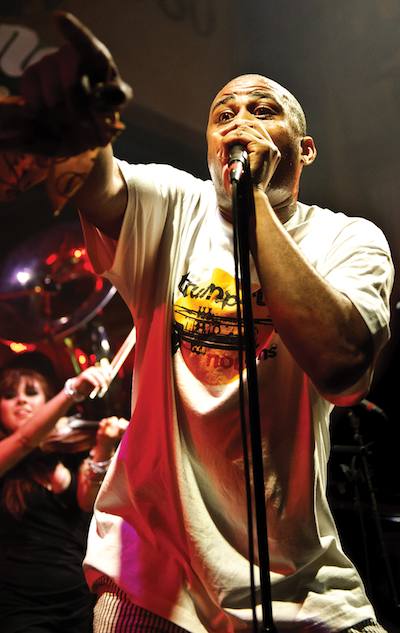Glen David Andrews played his first gig in two months Saturday at the Hudson River BBQ & Blues Fest in New York City. Andrews, who was last seen in New Orleans at a second line for the late Uncle Lionel Batiste, has been in a rehabilitation facility called Right Turn Inc. in Massachusetts for over a month. He was escorted to the New York show by a counselor from the facility and returned to Massachusetts after the show. Andrews still has a couple of months to go in his rehabilitation program and plans to return to New Orleans in November.
Andrews, who looked healthier than I’ve seen him in years, was in an ebullient mood before his performance. He’s allowed his hair to grow out a bit and was resplendent in a charcoal and white seersucker suit as he prepared to go on stage.
“This is the best I’ve felt physically in a long time,” said Andrews, “but it’s the best I’ve felt mentally in my whole life. I’ve got 35 days under my belt. The science that they’re using at Right Turn really works.”

Glen David Andrews (Photo: Golden Richard II)
Right Turn, formed in 2003 by former Del Fuegos drummer Woody Giessmann, deals specifically with musicians and artists and uses a novel approach to addiction treatment. The program uses creative workshops based on the theory that writing, playing music and art therapy are more effective ways to treat addiction than medication and abstinence.
“What we’ve learned is that the creative approach stimulates areas of the brain where addiction occurs and encourages the recovery process,” said Giessmann.
“They’ve dealt with major rock stars who are addicts and now they all clean,” said Andrews, who proudly showed me a green notebook filled with ideas for new songs. “My health is good. I work out five days a week. I run three miles a day. I meditate all day long. I write personal notes to myself. Everyone in there is a musician. We hang out together, play together, it’s awesome, the science of it.”
Andrews looked terrible in his last days before entering rehab, clearly in a shaken emotional state. Every time I’ve seen him in a second line he was leading the parade but at Uncle Lionel’s fete he stood on the neutral ground, watching the revelers passively.
“I was in a bad place,” he admitted. “It was the worst place I’ve been in. Sixteen years of pain all building to a head. It just fucked me up. And everybody drinking around me and all, that’s cool, but I have to stay away from it. I’m feeling more confident now. I’m humble at the opportunity I have to start over and I’m being real cautious in my sobriety. The only thing I do is drink coffee and smoke cigarettes now. I’m a real rehabber.”
That sobriety was evident in an Andrews performance that was sparked by his usual intensity and theatrical improvisation but was far less manic and much more focused than I’ve seen him recently. He performed an eye-opening reconstruction of the John Boutte/Paul Sanchez classic “At the Foot of Canal Street” in which he ruminated on his own mortality, then plunged into the crowd to lead a spirited second line during “Iko Iko.”
Most New York fans at the show had no indication that Andrews had been in rehab until he announced “This is my first gig sober in 16 years. I’m going to try to remain sober for the rest of my life.”
As the set progressed Andrews removed his jacket, then his shirt, and donned a New York Fire Department t shirt to finish the show. After, he smiled as he stood backstage in the sweat-drenched NYFD shirt.
“I was on stage the whole time, I never took a break,” he said proudly, “and I’m not even winded.”
Andrews is still not out of the woods. When he returns to New Orleans in November he will face potential prosecution stemming from a domestic violence case. While Andrews was in rehab the DA’s office raised the charge from battery to attempted murder, creating sensational front page news that Andrews could not defend himself against.
“I’m trying to stay away from all that other shit, like the Times-Picayune putting me on the front page,” said Andrews. “Putting me on the front page of the paper like that was a total smear campaign.”
Nevertheless, Andrews knows that his biggest battle is with his own past.
“The main thing isn’t what they did or anybody else did,” he said. “It’s what I did to myself and what I’m doing to overcome that. I’m doing this and I’m still with it.”




